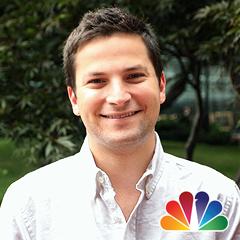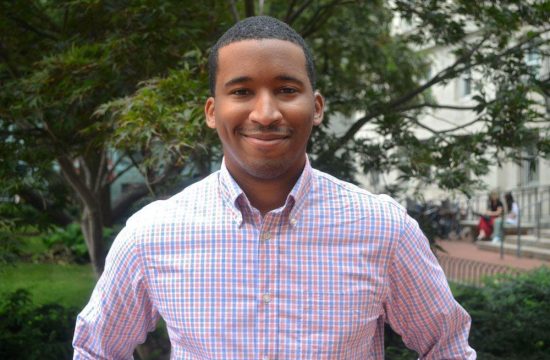Watch John Oliver do his, well, John-Oliver-Thing and you get the sense that he’s telling you the room is on fire and the doors are locked, but we’ve got this cup of water and, come on, you’ve gotta admit it’s gonna be funny trying to put these flames out.
In other words: Tune in to Oliver’s Last Week Tonight and you’re often going to learn something that’ll send you into an outrage—but somehow you’ll laugh. His comedy show has managed to do extended monologues on student debt, immigration courts, opioids and just about every other awful thing you can imagine. Again, it’s a comedy show. And a good one, at that.
Talking with Oliver in HBO’s New York offices ahead of the show’s Season 6 premiere on Sunday you get the sense that’s why he loves the gig.
“Often what the writers are getting presented with, it’s not just not funny, sometimes it’s kryptonite to the concept of laughter,” he said.
“There are times, more often than not, where it feels like an episode of Chopped where you just empty a sack of like broken glass, used needles, condoms and an elemental sense of sadness and you’re like, ‘I would like something that tastes delicious,’” he added. “But [the writers] do it! That’s the thing. It takes a broad, intense set of skills.”
It’s a careful balance of comedy and journalism—and it produces a show known for putting out 20-minute, informative, laugh-out-loud, scathing segments that can help shift the conversation surrounding some of America’s toughest subjects.
Oliver talked about that process, if President Donald Trump has ever been to a coffee shop, his former mentor Jon Stewart’s animal-rescue farm and much more with Newsweek this month. Here is that conversation, edited and condensed for clarity.
How do you go about making the Trump administration funny?
That’s a good question because, normally, the job of comedy is to take something substantial and kind of break it down into comedy. Whereas, when you have the president say something that he doesn’t mean, or things that are objectively false all the time, you end up having to go through a different system where you’re trying to inject meaning into something that he said that’s objectively meaningless. And then [you] justify why you’ve just done that. And then you write a joke.
That’s the problem. It’s so much vacuous nonsense that you feel like he’s just chumming the water with bullshit. One of the first things you need to do is convince someone why something that he’s just said—which does not seem like it’s worth listening to—is worth listening to.
It seems like, if you look at, say, Obama, a lot of the comedy was inserting absurdity. But now…
Exactly. That’s exactly it—[normally] you’re trying to insert absurdity into something that, like, contains protein. There’s nothing in [the Trump administration]. You’re trying to insert protein… and then make joke.
If you had 20 minutes alone with Trump, what would you say to him?
I wouldn’t. I’ve got no interest in talking to him. Interviewing him is pointless.
Even if you’re in line at a coffee shop, you’d just look the other way?
I’d wonder ‘What the f**k are you doing here?’ I don’t know if he’s ever been in line at a coffee shop.
I doubt it.
Like if he was in a coffee shop, he would probably not even physically be capable of seeing the line.
Has there been a recent story, a joke, some kind of project that’s made you jealous?
I don’t know if it’s jealous, so much as being excited by just how hard something is to do, but The Good Place. It’s just so… incredible…what they’re doing with that show. And the fact that they’re doing it—I think the thing that’s really exciting about that, in particular—is they’re doing it on network TV. They’re like a philosophical show about life, death and late-stage capitalism. It’s something you could probably do with relative ease on Netflix or HBO or any kind of streaming channel. The fact you’re doing it on NBC, the bar is so high. So much higher, the bar of difficulty.
Do you see any shared DNA between what you do and what they do?
No. [Laughs.] No, no, definitely not.
I might push back on that because I think you kind of Trojan Horse more serious things into a funny package… there’s at least that…
I think that’s probably as far as you can take it. It’s just so wildly difficult what the producers and writers are doing with that show.
And it’s popular!
That is the ultimate trick. To make it on a network and have people watch it and slide these incredibly complicated ideas into something that is constantly funny.
Sometimes you re-watch an episode and see like, “Oh I missed that pun!”
That’s the thing. It doesn’t wear any of it heavily on its sleeve. It’s constantly funny. Constantly silly. It’s brilliant.
What’s a risk you want to take, moving forward? You’ve established your show, it has been on for a while, what’s something you have in the back of your mind?
The thing that gets the most tantalizing is if we come up with ideas that are really difficult and the execution of them is a stretch. That’s where you want to see what the show is capable of, what our staff are capable of, by putting them under duress. Like, “Can you make a show out of this? … Let’s see. And can it be palatable?”
Shows that we’ve done that are immensely complicated, can you get away with it? Last year we did a show about cryptocurrencies, which is really hard to get your head around. We had to teach people about something, so that they had a base-level understanding, for any jokes about it to make sense. It was really technically difficult to do. I was really proud of [our staff], just in terms of how hard they worked. … It was just a massive, all-hands effort.
Is it a bit easier now, because there’s a level of trust with your audience? Like, “I’m going to get you there, believe me.”
I think so. But you just don’t want to betray that trust. You don’t want to take it for granted and you want to be sure that you are selling a story that is worth listening to. We had another really complicated story about Facebook’s behavior in Myanmar and I think we can… we’re lucky that we have a trapped audience [laughs], entrusting us with belief that there’s something funny or interesting at the end of this. But you’ve just got to make sure that’s true each time. Otherwise you can pretty quickly whittle away that trust.
You can’t just spend 20 minutes and there’s no payoff at the end.
Exactly. There’s only so many times you can betray that trust before it’s completely shattered.
With these sort of esoteric subjects do you ever stop and realize, walking around, I’m an expert on multi-level marketing… is it a curse?
[Laughs] It’s not me, it’s the whole show. So we’ll be the beneficiaries of a lot of different people’s expertise for a week. And then we’ll move on to something else. So, yeah, for the period of about like 72 hours, I really understood cryptocurrency. I’m pretty sure I don’t fully understand it again now because I’ve moved on to other things.
It seems like when you do these stories—especially with things like grifters or multi-level marketing—you’re spending time on things that are exploring the atmosphere of the Trump administration and maybe not so much time actually on it. Is it a goal to sort of show how we got to today’s America? I feel like you hit around the edges, instead of hitting the story of the week.
Yeah, it depends. It depends on how relevant he is to a story, or if he is relevant to a story by the fact that this is the United States president saying it. Like our piece about vaccines when he’s been a vaccine skeptic for a long time. Vaccine skepticism is not based in science; it’s very, very clear. But the fact that he’s now saying that as president is a big problem. Donald Trump, the host of Celebrity Apprentice, saying he was a vaccine skeptic? Who gives a shit. Donald Trump, the president, sadly you have to give a shit about that. He was barely present in that piece at all until right at the end, pointing out that this is a real problem. Any president co-sponsoring this idea is physically dangerous.
He’s a big part of it, but there are bigger things…
It’s a systemic problem but then he becomes a very dangerous amplifier.
It’s not like President Trump showed up in 2016 and everything changed. We were building toward it.
He exacerbates some systemic problems that are present. You could say the same for racism. America has problems with racism. Then Charlottesville happens, right? The president saying that kind of “both sides” bullshit is a huge problem. The Celebrity Apprentice host saying it, again, who gives a shit?
In the news environment today, there are all of these things happening all at once, do you try to pick something for a story that you know will have an impact? Something that you think people are missing?
I mean… not really. It’s not so much that people are missing it, because whenever we do a story there’s reporting on it but maybe it’s not broken through to people’s consciousness. We can act as a positive amplifier in that situation. Like when we did a piece on civil forfeiture, there was a shitload of good reporting from local news outlets, and I think The Washington Post, but we felt like it slid by people and we could turn people’s attention to it.
It was almost the same in the case last year deciding there was nothing more important than what just happened to Jamal Khashoggi. Let’s put everything else aside and really walk people through what happened and the ramifications of how it’s currently being handled by the president.
It seems like you feel an obligation to do things with a journalistic sensibility and you also have to be funny as hell, you have to make people laugh. It’s not, you know, the nightly news. Do you feel like you’re being tugged too far in either direction in certain weeks? Is there a good balance?
I think, in the end, we want to make a comedy show. The most important thing is that the writers come up with a funny take and a bunch of funny jokes to get our story across. But if they do that built on sand, the whole thing collapses and it’s a waste of time. It’s not that one is more important than the other, it’s that they have to function at a high level to make each other better.
It’s easier. You can only throw so much dry information at people, the human brain can’t absorb that. So you sometimes need the comedic instinct to help you imbibe that information for the first time.
Like you said with cryptocurrency…
Exactly! Otherwise it just washes over you. You just think, “I understood the first five things but then the next three I don’t understand anything.”
So, I’ve got one last question. It seems like this is a very fulfilling job for you…
Yeah.
You get to do really interesting things…
Yeah.
But they’re also kind of… uh, depressing, sometimes. Do you ever wish, “Ugh, I should have just done movies?”
[Laughs] No. No. Definitely not. I’m not an actor. It’s just not interesting to me. This is like—sadly, this is what I’m happy doing.
It’s a good job!
Not to put myself in the same breath as him, but, like, I don’t think Jon Stewart ever thought, “I should do more Death to Smoochy movies.”
You don’t know! Maybe he’s writing that right now. He’s off on his ranch…
[Laughs] It can’t just be runaway animals.





